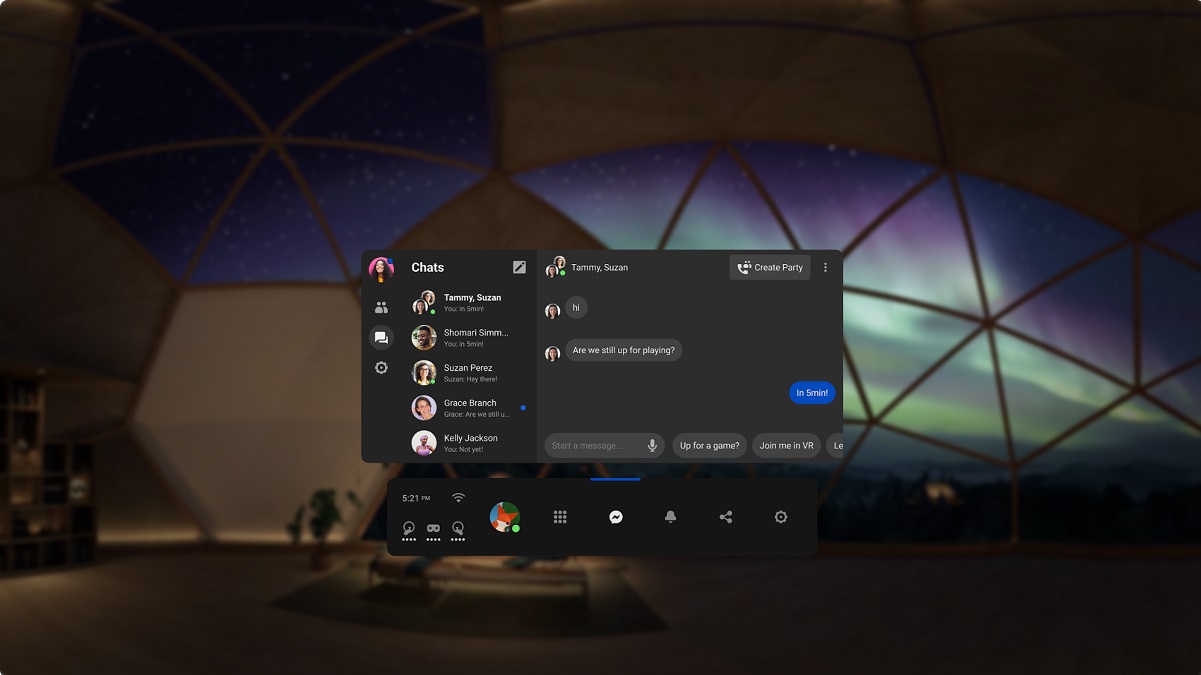
Facebook has made some interesting tweaks to the Oculus Quest and Quest 2 wireless Virtual Reality (VR) gaming headsets. One of the recent improvements is the inclusion of Facebook Messenger.
Facebook enabling the use of Facebook Messenger inside Oculus Quest VR headsets could be concerning for privacy advocates. However, the Virtual Reality ecosystem could immensely benefit from the inclusion of an interactive platform that traditionally relied on a display, keyboard, mouse, and a camera.
Facebook enabling Facebook Messenger for Oculus Quest VR headset is an excuse to mine more user data?
Just this week, Facebook launched a tweaked version of Facebook Messenger for the Oculus Quest and Quest 2 VR wireless gaming headsets. The VR version is similar in functionality to the standard Messenger.
The inclusion of Facebook Messenger isn’t raising any suspicion on its own. It the revised Facebook policy pertaining to the use of Oculus Quest headsets.
Facebook Messenger will only be available to those who have already connected their Facebook accounts to their Quest or Quest 2. This may seem voluntary or optional.
Facebook Messenger lands on Oculus Questhttps://t.co/irJtrqMY1d
— Valentin Valle (@valentinvalle) February 4, 2021
However, Facebook recently mandated Oculus Quest headset owners to link their Oculus account with a Facebook account. In other words, a Facebook account is now mandatory.
This requirement does create some problems for juvenile users. But more importantly, experts argue that including Facebook Messenger in Quest VR headsets could be the social media giant’s yet another attempt to mine user data.
Mandating the linkage of Oculus accounts to a Facebook account means the social media already has access to the Quest owners’ VR gaming habits. However, Facebook also collects data from its Messenger app.
https://t.co/WZUwQpiFKm…/
Facebook Messenger is coming to Oculus Quest headsets this week, the company has announced. Users who have logged into Oculus Quest and Quest 2 using their Facebook accounts #nowslife #FacebookMessenger #VirtualReality #VRheadset #OculusQuest2 #oculus pic.twitter.com/E3O05Zp7mU— Nowslife (@nowslife) February 4, 2021
As evident from WhatsApp’s Privacy Labels, Facebook collects a large amount of data on its users. It includes sensitive info for product personalization, analytics, and app functionality, device ID, and financial info for third-party advertisers. Moreover, there’s also a mysteriously labeled “other purposes” category.
When Facebook first announced it would require Oculus users to login with their Facebook accounts, it confirmed that would collect user data. Back then, the data included “relevant content” on “Oculus activity.” The social media giant indicated it would use the data to recommend Oculus events or VR apps.
Adding Facebook Messenger to a VR platform is beneficial?
There’s little doubt that Oculus and its VR gaming headsets could be yet another means for the company to collect more data on its users. Moreover, adding Facebook Messenger to the VR platform gives the company more opportunities to do that.
However, the interactive messaging platform heavily relies on a display, keyboard, and mouse. The Oculus Quest and Quest 2 headsets have a display. They also have two joysticks, which could replicate a mouse or finger taps.
Oculus Rolls Out 'App Lab' For Quest Developers, Messenger On Oculus – VRScout https://t.co/cY1lyoKj5s pic.twitter.com/2ic6RBJOz5
— [email protected] (@3dguytv) February 4, 2021
However, all this might not be good enough to chat effortlessly. In a Press Release, Facebook noted that users can write messages by typing them out in VR. Alternatively, users could select something pre-written, or use its voice-to-text feature. The company didn’t offer a detailed demo or went beyond the aforementioned solutions.
While typing inside a VR chat app might seem cumbersome, there are many more potential solutions out there. Oculus Quest has been developing algorithms that track the user’s hands. There are apps that recreate a virtual keyboard, which shows users a variety of desktop-grade keyboards. Users can type on such a virtual keyboard while mimicking actual typing.
Regardless of what you think about FB, THIS is good news for accessibility! — Facebook Messenger now on Oculus https://t.co/gF2xO1Ki30
— Donna Z. Davis (@dzdavis) February 4, 2021
None of the solutions are perfect for typing effortlessly. And this is where Facebook Messenger comes into the picture.
Adding Messenger to a VR platform indirectly forces Facebook to commit considerable resources for developing improved text input in VR. Solutions that could emerge from R&D could help improve quality of life in other accessibility-challenged scenarios.
Incidentally, Facebook is giving the option to log out of Messenger on the Oculus headset. Hence those concerned about privacy can merely log out. Doing so will also improve the “immersion” factor.


